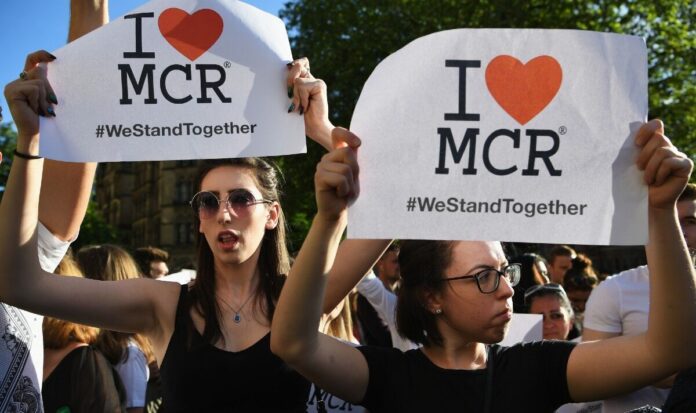The mother of a woman killed in the 7/7 bombings has said nothing has changed in the emergency services’ response to terror attacks. Sarah Jenkins said the families of the 22 people killed at the Manchester Arena attack had been as badly let down as hers.Mrs Jenkins’ daughter Emily was killed in the suicide attacks which targeted commuters during the morning rush hour in the capital on July 7, 2005.She had to wait 11 days until it was confired Emily was among the 52 victims.Emergency services chiefs apologised on Thursday for their “wholly inadequate and totally ineffective” response to the Manchester Arena bombing on May 22, 2017.The apologies came after the publication of a report which found two of the 22 people murdered could have survived had it not been for inadequacies in the emergency response. Members of the public attend a candlelit vigil, to honour the victims of the terror attack (Image: Getty) A member of the public weeps at a vigil for the victims of the Manchester Arena attack (Image: Getty) Armed officers in Manchester in the aftermath of the attack (Image: Getty) Members of the public are evacuated from Manchester Arena (Image: Getty)Mr Atkinson’s family said it “should simply never have been allowed to happen”, adding: “It is crystal clear that due to those failings, John died from injuries that he could and should have survived.”Manchester Arena Inquiry chairman Sir John Saunders delivered a scathing report on the response of the emergency services on Thursday.Sir John said: “Significant aspects of the emergency response on May 22 2017 went wrong. This should not have happened.”Some of what went wrong had serious and, in the case of John Atkinson, fatal consequences for those directly affected by the explosion.”DON’T MISS: Rishi Sunak under pressure as triple lock backed in new poll [LATEST] Arts cuts will see the curtain come down in capital [REVEALED] Iran built drones used by Russia with Western help, warns report [REPORT] Emergency services at the scene of the 7/7 bombings (Image: Getty)Initial command of the incident was taken by Greater Manchester Police’s force duty officer, Inspector Dale Sexton, but the report found he “quickly became overburdened by the number of tasks he had to undertake”.Fire crews took more than two hours to reach the scene after station manager Andy Berry chose to mobilise resources three miles from the Arena amid fears over safety.Sir John said North West Ambulance Service operational commander Dan Smith made an “error” in not sending ambulances to meet at Manchester Central Fire Station rather than going direct to the scene.Lawyers for eight-year-old Saffie-Rose Roussos, the youngest victim of the attack, had submitted during the inquiry that her injuries were potentially survivable. A bus torn apart in the 7/7 bombings in London (Image: Getty)Sir John concluded: “In the case of Saffie-Rose Roussos, it is highly unlikely she could have survived her injuries. There was only a remote possibility she could have survived with different treatment and care.”I do not consider the evidence enables me to say she had absolutely no chance of survival if the most comprehensive and advanced medical treatment had been initiated immediately after injury.”I make clear what I am postulating is a remote possibility of survival.”Mrs Jenkins, 76, said: “I do feel that if you join the ambulance service or the police or fire brigade you’ve joined to help people and save lives, not to sit outside the Arena or go to the wrong Tube station or not go down a tunnel or drive away from the area, as happened at Manchester and on 7/7.After the 7/7 bombings, Mrs Jenkins and Emily’s three siblings visited hospital after hospital in a bid to find her. They also retraced the route their loved one would have taken on the day of the attacks and phoned helplines over and over again.Since 7/7, Mrs Jenkins has campaigned for technology to be used so families can access up to date information about loved ones in a terror attack or emergency.She said: “It’s clear nothing has been done. Hospitals don’t want grieving families getting in the way, but we felt we had no choice as we were being told nothing about whether Emily had been found, whether she was being treated somewhere or if she had died and her body was being held somewhere.”It was just wrong that we should have had to do that or that the Manchester families had to do that.”Inquests into those who died in the 7/7 bombings found there had been several delays in the the emergency services’ response to the blasts.This included delays in firefighters being deployed to Tube tunnels as crews waited for official confirmation the live electric rail had been turned off.There were also problems caused by the police’s digital communications equipment not working below ground.Despite her campaign efforts, Mrs Jenkins has not met relatives of the Manchester Arena bombing.She told the Telegraph: “I know I can’t give them any words of comfort. I can’t say their grief will get better, because it won’t.”
Mother says Manchester Arena response shows nothing learned from 7/7
Sourceexpress.co.uk
RELATED ARTICLES


